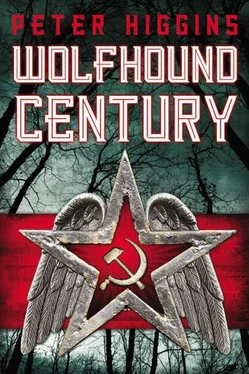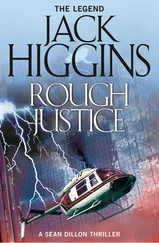‘Well, yes but—’
‘You will probably fail, of course,’ said Krogh. ‘But you might just succeed. You find Kantor, Lom, and you stop him. By any means possible. Any at all. And more — you find out who’s running him. Somebody here is pulling Kantor’s strings. Find out who it is. You find out what the bastards are up to, Lom, and when you do, you tell me . Only me. Got that?’
‘Yes.’
‘You’ll be on your own,’ said Krogh. ‘You’ll have no help. No help at all. This is your chance, Lom, if you can take it.’
Josef Kantor was reading at his desk. The window of his room stood open. He liked how night sharpened the sounds and perfumes of the wharf. He liked to let it into his room. There was no need for the lamp: arc lights and glare and spark-showers flickered across the pages of his book. There was no better light to read by. The light of men working. The light of the future.
He heard the quiet footfall on wet paving, the footsteps climbing the iron staircase. One person alone. A woman, probably. He was waiting in the shadow just outside his door when she reached the top, his hand in his jacket pocket nursing his revolver. He made sure she was in the light and he was not.
‘Who are you?’ he said.
‘I’m sorry,’ she said. ‘I meant never to come here, but I had no choice.’
A group of men just off their shift were coming up the alleyway, talking loudly. Curious glances at the woman on the staircase. She wasn’t the kind you saw in the yard at night. They would remember. Kantor didn’t need that sort of attention.
‘Go in,’ said Kantor.
He followed her into the room and lit the lamp. He saw that she was young — early twenties, maybe — and thin. Her hands were rough and red from manual work, her wrists bony against the dark fabric of her sleeves, but her face was filled with life and intelligence. Thick black hair, cut short around her neck, fell across her brow, curled and wet. It had been raining earlier, though now it was not. Her coat was made of thin, poor stuff, little use against the weather, but, fresh and flushed from the cold, she brought an outside air into the room, not the industry and commerce of the shipyards but fresh earth and wet leaves. She met his gaze without hesitation: her eyes looking into his were bright and dark.
There was something about her. It unsettled at him. She was not familiar, exactly, but there was a quality in her that he almost recognised, though he couldn’t place it.
‘You’ve made a mistake,’ he said. ‘Wrong person. Wrong place.’
‘No. You’re Josef Kantor.’
Kantor didn’t like his name spoken by strangers.
‘I’ve told you. You’re mistaken,’ he said. ‘You’re confusing me with someone else.’
‘Please,’ she said. ‘This is important. I’m not going until we’ve talked. You owe me that.’
She took off her coat, draped it over the back of a chair and sat down. Underneath the coat she was wearing a knitted cardigan of dark green wool. Severe simplicity. Her throat was bare and her breasts were small inside the cardigan. Kantor was curious.
‘Since you refuse to leave,’ he said, ‘you’d better tell me who you are.’
‘I’m your daughter.’
Kantor looked at her blankly. He was, for once, surprised. Genuinely surprised.
‘I have no daughter,’ he said.
‘Yes, you do. It’s me. I am Maroussia Shaumian.’
It took Kantor a moment to adjust. He had not expected this, but he should have: of course he should. He had known there was a child, the Shaumian woman’s child, the child of the frightened woman he’d married all those years ago, before Vig, before everything. That affair had been a young man’s mistake: but, he realised now, it had been a far worse mistake to let them live. He studied the young woman more carefully.
‘So,’ he said at last. ‘You are that girl. How did you find me?’
‘Lakoba Petrov told me where you were.’
‘Petrov? The painter? You should choose better friends than Petrov.’
‘I haven’t come here to talk about my friends.’
‘No?’ said Kantor. ‘So what is this? A family talk? I am not interested in families.’
Maroussia put her hand in the pocket of her cardigan and brought out a small object cupped in her hand. She held it out to him. It was a thing like a nest, a rough ball made of twigs and leaves, fine bones and dried berries held together with blobs of yellowish wax and knotted grass. ‘I want you to tell me what this is,’ she said.
Kantor took it from her. As soon as he held it, everything in the room was the wrong size, too big and too small at the same time, the angles dizzy, the floor dropping away precipitously at his feet. The smell of resinous trees and damp earth was strong in the air. The forest presence. Kantor hadn’t felt it for more than twenty years. He had forgotten how much he hated it. He swallowed back the feeling of sickness that rose in his throat and moved to throw the disgusting thing onto the fire.
‘Don’t!’ Maroussia snatched it back from him. ‘Do you know what it is?’ she said. ‘Do you know what it means?’
‘No,’ he said. ‘No. Where did you get it?’
‘Mother has them. I stole this one from her. I don’t know where she gets them from, but I think they come from the forest, or have something to do with it.’
‘Nothing useful ever came from that muddy rainy chaos world under the trees. That’s all just shit. So much shit.’
‘I think these things are important.’
‘Then ask your mother what they are.’
‘She can’t tell me.’
‘Why not?’
‘Do you really not know? Don’t you know anything about us at all? You could have found out, if you wanted to.’
It was true. He could have taken steps. He had considered it while he was at Vig, after the Shaumian woman had left him, and later. But it would have meant asking questions. He had told himself it was better to share with no one the knowledge of their existence. That had been stupid. He could see that, now. Now, it was obvious.
‘My mother isn’t well,’ the girl was saying. ‘She hasn’t been well for years. In her mind, I mean. She’s always frightened. She thinks bad things are happening and she is being watched. Followed. She never goes out, and she’s always muttering about the trees. For months now these things have been appearing in our room. I’ve seen three or four, but I think there have been more. She pulls them apart and throws them away. She won’t say anything about them, but she keeps talking about something that happened in Vig. Something that happened when she went into the trees.’
‘You should forget about all that,’ said Kantor. ‘Forget the past. Detach yourself. Forget this nostalgia for the old muddy places. Trolls and witches in the woods. These stories aren’t meant to be believed. Their time is finished.’
‘They’re not stories. They’re real. And they’re here. They’re in the city. The city was built on top of it, but the old world is still here.’ She held up the little ball of twigs and stuff. ‘These are real. These are important. They’re from the forest, and my mother is meant to understand something, but she doesn’t. Something happened to her in the forest long ago. And…‘ She hesitated. ‘She keeps talking about the Pollandore. I need you to tell me what happened then. I need you to tell me about the Pollandore.’
For the second time, Kantor was genuinely startled. Whatever he had expected her to say, it was not that.
‘The Pollandore?’ he said. ‘It doesn’t exist.’
‘I don’t believe that. I need you to tell me about it. And tell me about my mother. What happened to her in the forest? It’s all connected. I need to understand it. I have a right to know. You’re my father. You have to tell me.’
Читать дальше












